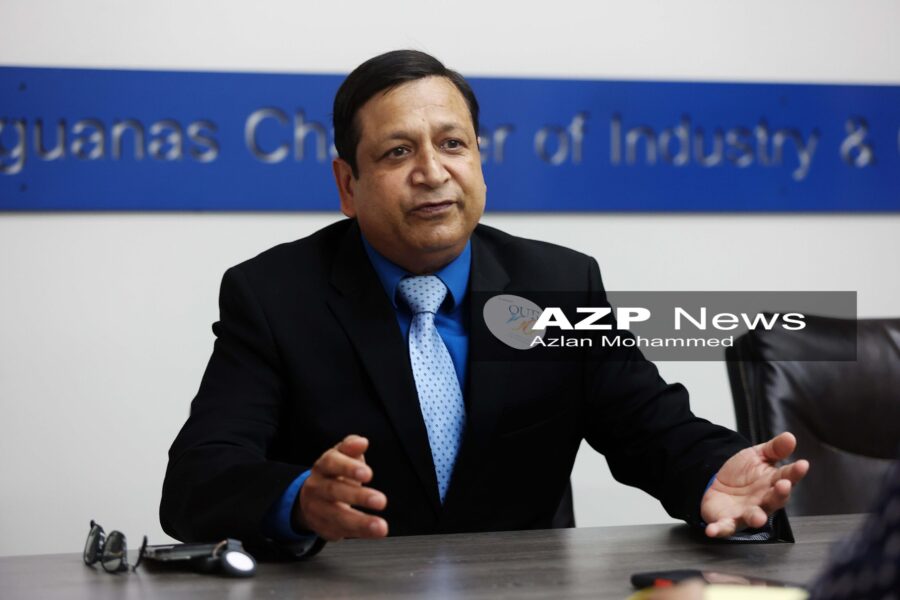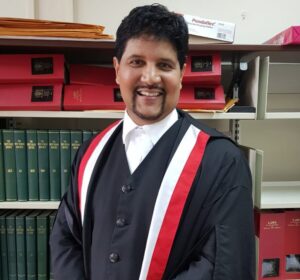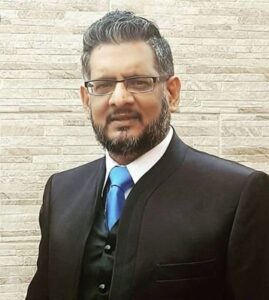By Sue-Ann Wayow
SPLIT into two constituencies and manned by a borough corporation, for years there have been calls for Chaguanas to become the third city in Trinidad and Tobago.
The Chaguanas Chamber of Industry and Commerce (CCIC) play a key role in the rapidly developing district that connects south and north Trinidad.
This week AZP News interviewed newly-inducted President of the CCIC Baldath Maharaj who has been a board member for the past 12 years.

Originally from Granville in south, Maharaj adopted Chaguanas as his second home as it presented an opportunity for upward movement.
Living in Chase Village and now sitting as head of the CCIC, Maharaj, the area manager for First Citizens Bank (FCB) wants to make a difference.
Working together with other stakeholders in Chaguanas, Maharaj is hopeful that positive transformation, improvement, development and impact can be made.
He admits that there is a fair enough relationship with both Members of Parliament for Chaguanas West and East, Dinesh Rambally and Vandana Mohit respectively, as well as with Chaguanas Mayor Faaiq Mohammed.
The Chamber is part of a security committee involving the mayor who hosts the meetings, police and other interested persons in the borough. They meet on a regular basis for discussions.

Crime number one issue in Central
Topping the list of issues is crime.
Maharaj told AZP News that the Central Division now ranks second in crime in the country after the Northern.
He said with crime, persons become numb to it.
Maharaj is adamant that crime must be dealt with and the chamber will be involved somehow but the question was how.
He gave examples that at previous breakfast meetings with police officers interacting with the public, advice was shared on how individuals could better protect themselves from criminal elements including those who are certified with use of firearms.
“We want people to feel comfortable. Apart from being protected and feeling comfortable, people are in fear,” he said.
One of the main preventative measures could be a greater penalty for crimes committed, Maharaj suggested.
“If there are consequences for the criminals, then we will see a reduction in crime. Now, there are very little consequences,” he said.

If criminals engage in the act, without serious repercussions, they were motivated to continue with the illegal activities, acknowledging that there were “real criminals” who do crime regardless of consequence or any other deterrent.
He mentioned the payout to the nine former murder accused men in the Vindra Naipaul-Coolman case.
Maharaj said, “We saw with the Vindra Naipaul-Coolman murder, these people, I am not saying that they are guilty but they were awarded $2 million plus because of the inefficiencies we face in our system.”
He asks, “What motivation does it give to share information? What motivation does it give for the average citizen who has no local standing to say, I will come and support you, I will give information? There is really none.”

Maharaj added there were some police officers who may have previously been involved in illicit conduct before joining the Trinidad and Tobago Police Service (TTPS) and this continued after becoming an officer.
“Why can’t we do psychometric assessments to find out from these people, what their real intentions are? Can we not do a polygraph test every year as part of the performance appraisals to weed out the bad cops?” Maharaj asked.
He added, “When the criminals do their thing, they know who they could call.”
Police raids could be done without warning so that criminals could be caught red-handed, Maharaj said.
Locking down of certain areas and sting operations could also be done frequently and spontaneously to create a level of discomfort from the criminals while they are on the roads as criminals were forewarned of police presence and operations. He said, “They are doing it, but not enough to make the criminals feel uncomfortable.”

Police patrols can also be done on a regular basis.
Maharaj said it should not take much to have at least two police officers patrol Chaguanas Main Road – the central business district – constantly. A good working camera system along the streets may also make it less attractive for criminal activities.
He also questioned how a normal person being stopped by blue flashing lights in the night not comply, when it could someone impersonating a police officer.
That needed to be addressed, Maharaj said, noting that police equipment and army camouflage were being used by criminals.
“The police have not yet addressed how we should deal with a situation like that. It is a very tricky situation and we have not been told how to deal with matters like that,” he said adding that by the time, some-one asks for police identification, that might be too late.
He is expectant that with the appointment of a Commissioner of Police (CoP), that policing would improve as opposed to some-one acting in the position.
Customs and foreign exchange
Maharaj agreed with President of Couva/Pt Lisas Chamber of Industry and Commerce Mukesh Ramsingh that port problems were creating price problems for the consumer as businessmen continue to have long waiting times before their goods could be cleared.
Trinidad and Tobago was no longer the transshipment hub it used to be, he lamented, due to the long waiting time.

Tying it back to crime, along with the use of scanners, he said police officers or other authoritative figures could check up on customs officers to ensure that transactions were above board.
“Every (custom) officer is a law upon himself. If we could get independent people who does not have friends inside of there to intermittently go and check to see what they have and how they are clearing the goods and what is the contents, some sort of authority so that they know ‘I could be caught.’” Maharaj said.
He is in support of the privatisation of the Port of Port of Spain saying it will assist in dealing with the inefficiencies.
With the access to foreign exchange still being an issue, Maharaj said persons looked to the black market to get US dollars.
The black market also provides illegal cigarettes which are purchased by many providing no competition to businessowners getting cigarettes through the legal means and to get it through illegal means, “the system encourages that,” he said.
Traffic
Maharaj said the jurisdiction of the roads continue to pose a problem since some roads fall under the Chaguanas Corporation Borough and others under the Ministry of Works and Transport.
He has received the assurance from the mayor that the ministry had issued estimates for some roads and soon they should be fixed.
Maharaj said “quick fixes” were being looked at as bad road conditions added to the traffic congestion.
He said someone agreed to smoothen an undulating road near to Price Plaza free of charge and was awaiting approval from the ministry.
While some long-term measures would be timely and costly, “quick fixes” could go a long way in alleviating some of the traffic.
He said with the contribution of equipment, labour and material, the ministry could fast-track approvals to have the work done as there were willing individuals to make those contributions.
“Travelling from east to west of the highway is always a challenge,” Maharaj said.
The possibilities were being looked at to perhaps have roundabouts in place at both ends of the Chase Village flyover instead of a triangle at the western end and persons doing illegal turns at the eastern end.
“It is the bottleneck here and there, that causes the issues,” said.
Chaguanas Library- an eyesore
Chaguanas is in need of a library.
The current building is now abandoned and a home to street dwellers and rodents.
Maharaj said any new library should not be as the traditional one filled with books alone, but where users could have video conferencing and access to devices for research material with proper parking.
He said most of the scholarship secondary school winners were from Central and South Trinidad.
“Why not create more opportunities for those people who have the academic intelligence and they could use the library as a platform and go ahead and do better things for Trinidad,” Maharaj said.
Financial literary would also be on the agenda for the CCIC.
CCIC – a power chamber that is independent
Maharaj also indicated his willingness to meet with the Opposition on issues relating to development as Opposition Leader Kamla Persad-Bissessar said she would like to meet with groups and organisations and smaller political parties.
He did emphasise that the Chamber would not be politically biased or aligned in any way but would work for community development.
The CCIC while having a good relationship with other business chambers, preferred to stand on its own.
Maharaj spoke well of his predecessor Richie Sookhai who resigned to take up his position in the Senate as a Government Senator.
He said that Sookhai, while president, also criticised the Government on certain aspects but not without justification and did not display any political partisan while involved in the Chamber.
“We have been calling a spade a spade as it relates to both the Opposition and Government,” Maharaj said.
For the Maharaj personally, he wants to make a difference.

His vision is to continue the work started by Sookhai and to have the Chamber get a space they can call their own.
Maharaj said, “I want to make a difference. I don’t want to make a difference on the newspapers or in the network. I want to make a difference in the people that depend on us even if it is with the small quick fixes.”
He said the CCIC would be working to have representatives in the other groups within Chaguanas such as the taxi services, market and those who may be under represented.
“When we make the difference to you, we make the difference to the businessmen, to the business community and to all of us.”
Maharaj added, “I do not want to have large aspirations that I cannot fulfill but I will start with what we are already doing.”
![]()













